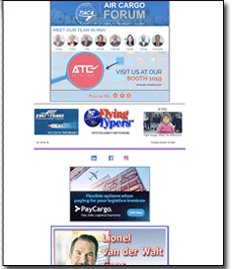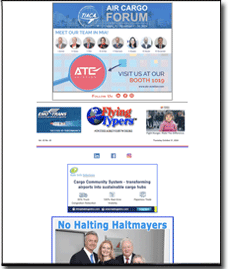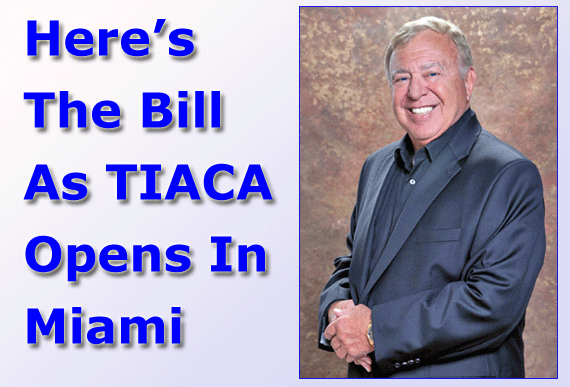 |
With all eyes looking at this year’s
Air Cargo Forum in Miami Nov 11th - 14th hosted by TIACA, this is the
Association’s presentation of the ACF:
“In 2024, we would like to enhance
the ACF even more! Aligned with our key event principles as a membership-focused
organization we feel that it is vital that the ACF remains a world-class
global event, that brings the entire air cargo community together and
aims to add value to the industry at large. We’re looking forward
to offering guests the complete package; exhibition, sponsorship, advertising,
networking opportunities, and plenty of fun! We are excited to deliver
another successful ACF that encompasses TIACA’s event principles
whilst offering more opportunities for attendees to network, such as a
golf tournament, receptions, exciting pre/post event excursions, and well-planned
after parties. It’s vital and necessary that attendees enjoy themselves
in one of the world’s top tourist destinations. The ACF is much
more than an event . . . it’s an experience.”
Of course the who’s who of Air Cargo
will be there and one could just wish to have 200 hands to shake them
all and 400 hearts to beat at the same rhythm and 1,000 souls to feel
and enjoy the atmosphere.
But there is one person in particular named
Bill Boesch, whose involvement with TIACA spans the entire duration of
the Association from the very beginning. Here as TIACA readies its Miami
opus November 12, Blll who will not attend the event, shares memories
of the time when TIACA was formed and also takes measure of the air cargo
industry today and tomorrow.
With over 50 years of experience in the
transportation and logistics industries, Bill Boesch is an unparalleled
subject matter expert on the intersection of logistics operations, commercial
aviation and United States Defense policy. Mr. Boesch founded and continues
to lead the Council for Logistics Research, Inc. as CEO and Chairman and
has served as a high-level executive in many stages of the logistics industry.
Mergers and acquisitions, integration, logistics management, supply chain
logistics, mail, airline management, freight forwarding, ground transportation,
IT development and systems, government affairs, global trade alliances,
and union negotiations and contracting, security and defense it is all
there in one single brain!
With this kind of quality and gravitas one
could expect no surprise from his spoken words in public.
In November 2024 Bill Boesch has the experience
and knowledge of a couple of generations and yet his words are as sharp
as the scalpel when it comes to analyzing the issues of the sector.
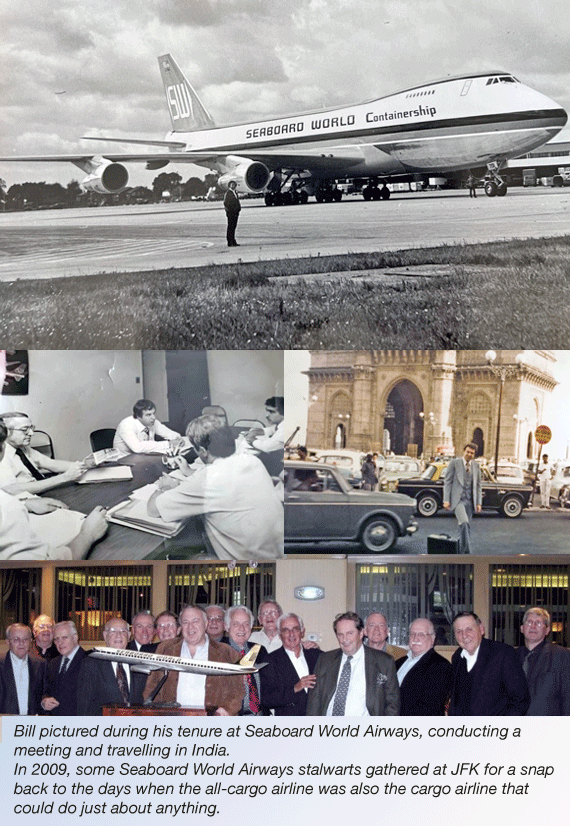 |
For those who might not know Bill Boesch personally
I need to give some details of this extraordinary career. Beginning in
1965 as a graduate student working for Seaboard World Airlines, a pioneering
cargo carrier serving the U.S., Europe, Africa, and Asia, which was a
major transporter of troops and material to Southeast Asia, Mr. Boesch
held various positions before becoming Vice President and Director of
Worldwide Sales in 1978. These responsibilities continued into Flying
Tiger Airlines after the merger with Seaboard in 1980. In 1982 Emery Worldwide,
a major airfreight forwarder, aircraft operator, and logistics provider
saw Mr. Boesch climb to Senior Vice President and General Manager of Emery
in 1985 and then Executive Vice President and General Manager in 1987.
Time to go back to the airlines: Pan American World Airways’ Senior
Vice President of Cargo was the new role, then Senior Vice President for
Passenger Marketing and Cargo Operations in 1988, and another leap forward
to join American Airlines as Vice-President of Cargo, President and CEO
of the Cargo Division in 1991 and Chairman of the Cargo Division in 1996
before retiring from the post in 1998. In 2004, Bill was asked to reorganize
the U.S. operation as CEO of DHL Global Mail.
Mr. Boesch has served in different industry
associations with corporate responsibilities: Chair of the International
Air Transport Association’s (IATA) Cargo Executive Subcommittee,
Vice Chairman of IATA’s Cargo Committee, in the Board of Directors
of Air Cargo Incorporated, Air Cargo International, The International
Air Cargo Association (TIACA), Envirotainer, Deutsche Post Global Mail,
Smart-mail, DHL Global Mail, and Al Seqir/Falcon.
Bill Boesch is presently providing senior
level advice and analysis to (Joint Chiefs Logistics (JSJ4) on all aspects
of the commercial air transportation industry and logistics and continues
to participate in other various U.S. Government projects to secure and
update essential logistics systems and improve the global security environment,
for many years’ involvement in military and defense operation of
the U.S. Government in various areas of the world.
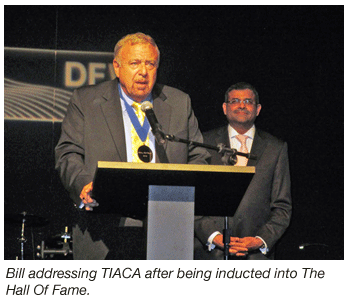 Mr.
Boesch was awarded the Heroes Medal from the government of Afghanistan
for his leadership on the project and his assistance to the country and
its people. He has the honor of holding numerous industry awards including
the Lifetime Air Cargo Achievement Award, the Ellis Island Medal of Honor,
induction into the TIACA Hall of Fame, and numerous Department of Defense
(DoD) distinctions. Mr.
Boesch was awarded the Heroes Medal from the government of Afghanistan
for his leadership on the project and his assistance to the country and
its people. He has the honor of holding numerous industry awards including
the Lifetime Air Cargo Achievement Award, the Ellis Island Medal of Honor,
induction into the TIACA Hall of Fame, and numerous Department of Defense
(DoD) distinctions.
FlyingTypers managed to extract
some ideas from this exceptional and tireless aviation hero just days
ahead of the big shebang in Miami.
This is what Bill told us regarding the
evergreen subject of forwarders/airlines interaction:
“Back in the 70s and early 80s
the airlines started to have an adversarial view of the forwarders feeling
that they were controlling the customers, demanding lower rates, canceling
bookings at the last minute when they found an airline that would give
them a low spot rate and making much of the profit, while the airlines
had the major costs. As a result airlines decided to compete with the
forwarders and go directly to the commercial customers. I always thought
this was a mistake because the forwarders served a vital role in reducing
airline costs by assembling all of the cargo, palletizing it, putting
it under one airway bill and the airlines avoided managing hundreds of
trucks dropping off small shipments, palletizing the shipments, loading
them into containers, and having multiple billings . . . this would require
a substantial increase in organized labor, which is a major cost to the
airlines. On the other side the forwarders felt that they were playing
a vital role and had limited interaction with the airlines who were talking
to each other in IATA, as in those days the airlines had antitrust immunity
in IATA meetings at two specific locations.”
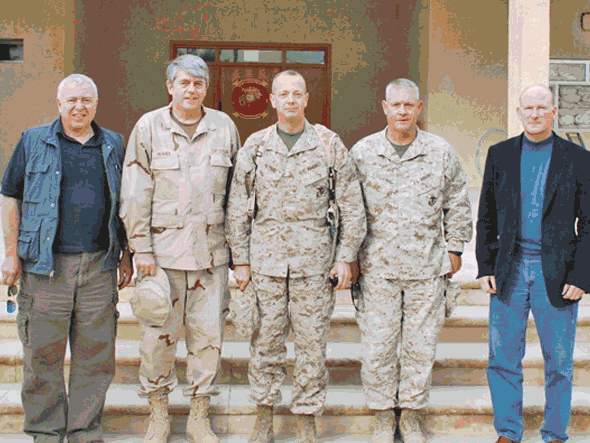
Bill leveraged what he learned, in air cargo and growing up on
the streets of New York City, in Iraq and Afghanistan, often times
risking his life out in the countryside negotiating with Sheikhs and
others to build better supply routes. The result kept U.S. soldiers
safe while building local employment. For his efforts Bill received
numerous Department of Defense (DoD) distinctions. |
We remember when KLM started this game
in Italy and declared, “unlike passengers, cargo has no legs.”
In a way this is not so far from what Bill
Boesch correctly describes in his statements. It was quite clear to me
even in those days that only the interaction of freight forwarders and
airlines could fly cargo in the air. Indeed, it is quite clear to any
forwarder that no shipper would be willing to make the investments and
undergo the procedures. Maybe this concept was less apparent to airlines
then. A lot of time could have been saved if the two parties learnt how
to speak to each other, and, if I may say so, listened to each other much
more that they did. In the area of reciprocal understanding Bill Boesch’s
contribution was and still is crucial.
“In order to start a dialogue
between the forwarders and the airlines in a healthy environment, a few
of us in the airline cargo business and at some large forwarders felt
that having an organization where we could meet in a productive environment
and discuss matters would be beneficial. I was running AmericanAirlines
Cargo at the time and hosted a meeting in the AmericanAirlines conference
room in Dallas, Texas, where a few airlines and forwarders got together
and decided to have an organization with forwarders and airlines.
“We then had to decide what to call
the organization and had a few good names, but finally settled for The
International Air Cargo Association or TIACA at the meeting. The rest
is history.
“I personally was very honored to
host this meeting and pull the forwarders and the airlines together, so
that we both understood each other’s problems and started to work
together in a partnership approach to work out the areas troubling each
of us.”
So that was then and we have actually seen
some ups and downs in the last couple of decades. I am not so sure that
the progress made was firmly maintained all through time. Suffice to say,
as example, that FIATA and IATA still have not managed to achieve their
“modernization” agreement.
The landscape changed in the meantime and
an almost entirely different arena developed containing older and newer
actors participating in the same play.
Bill takes a bold view on this:
“Unfortunately,today is an entirely
different marketplace in which you have the integrators, Amazon and major
forwarders entering into long-term ACMI leases to move the freight. But
this also had a positive effect on some of the all-cargo airlines, creating
guaranteed business for the use of one or more of their aircraft.
“The big question is that the market
is changing again with the majority going to the integrators and the Amazon
type businesses, which in fact deal directly with the commercial customers
that in the past dealt with the airfreight forwarders.
“We all have to adapt to the changing
air cargo market, which is basically now based on e-commerce and the integrators.
“You saw how well Amazon, FedEx and
UPS did in their quarterly reporting and their stock price . .
. A good question is what is the effect of this market change
going to do to the traditional freighter market and the forwarders. How
are they adapting to this?
“As you know, I have always said the
Air Cargo market is a market that is not yet fully matured.
“When I was young many years ago,
I used to look at the Cargo reports and saw that the major amount of business
was shipments under 50 pounds: at first they were controlled by the forwarders
and then it went to the integrators and now the integrators have a challenge
with the e-commerce companies that have sophisticated computer systems.
“I know every night sitting in bed
I go to the Amazon site and usually buy something: you don’t do
this with FedEx or UPS as you need to go to the direct sellers site and
buy something and most people will not buy it if they have to pay for
the shipping so the integrators had to lower their prices to these customers
and get more efficient you can see this at both FedEx and UPS . . . ”
Bill Boesch left it at that with us.
It is not surprising, considering we are
looking at a rapidly changing picture. Having
some experience in the freight and logistics industry of my own, I can
safely say that the picture airlines and forwarders contemplate today
is perhaps even more complex and subject to even greater number of variables
than we used to consider in the beginning of the forwarder/airline relationship
debate. From some points of view, the forwarder/airline debate could even
be considered out of date, if you take Bill Boesch’s words literally.
I think I did use this expression already
in the past, but it seems to be fitting this time: maybe this is just
another case of history repeating . . .
In the ‘add some music to your day’
genre as TIACA ACF 2024 Miami starts, in 1997 the Propellerheads offered
a new
version of the old classic with the same refrain, but Shirley Bassey
was still the queen of the scene.
Listening to this music wonder whether Ms.
Bassey has ever had a freight forwarders’ background?
Thanks Bill, until next time . .
.
GDA/Marco Sorgetti
|




